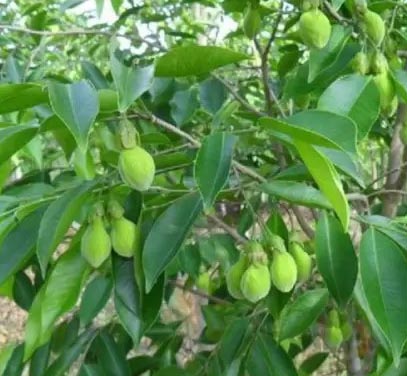Thailand medical study finds Agarwood extracts offer neuroprotective benefits and can prevent neurodegenerative diseases
Nikhil Prasad Fact checked by:Thailand Medical News Team Aug 28, 2024 7 months, 4 weeks, 1 day, 3 hours, 4 minutes ago
In an exciting new development, researchers from Chulalongkorn University in Bangkok, Thailand, in collaboration with experts from the University of Hong Kong and The George Washington University in the USA, have uncovered the neuroprotective properties of Agarwood, scientifically known as Aquilaria crassna. This
Thailand Medical news report dives into the groundbreaking findings of this study, which suggest that extracts from Agarwood leaves could play a vital role in preventing neurodegenerative diseases, a pressing global health concern.
 Thailand medical study finds Agarwood extracts offer neuroprotective benefits
Thailand medical study finds Agarwood extracts offer neuroprotective benefits
and can prevent neurodegenerative diseases
The Neurodegenerative Challenge
Neurodegenerative diseases such as Alzheimer’s and Parkinson’s are characterized by the gradual loss of neurons, leading to significant cognitive and motor impairments. These diseases currently have no cure, and existing treatments mainly focus on managing symptoms rather than halting disease progression. Given the multifaceted causes of these conditions, including genetic factors and environmental toxins, the search for effective preventive and therapeutic interventions is ongoing.
Agarwood: A Traditional Remedy with Modern Applications
Agarwood, commonly used in Southeast Asian traditional medicine, is renowned for its sedative properties and treatment of various ailments, including inflammation and gastrointestinal issues. However, its neuroprotective effects have only recently come to light.
In this study, the research team focused on the effects of Agarwood leaf ethanolic extract (ACEE) on neuronal cells exposed to benzo[a]pyrene (B[a]P), a toxic compound known to induce neurodegeneration. B[a]P is commonly found in environmental pollutants, such as cigarette smoke and grilled foods, making it a significant concern for public health.
The Study: Exploring Agarwood’s Neuroprotective Potential
The research team employed human neuroblastoma SH-SY5Y cells, a model often used to study neurodegenerative processes, to explore the effects of Agarwood extract. They treated these cells with B[a]P to simulate the conditions that lead to neurodegeneration. The cells were then treated with varying concentrations of ACEE to observe its potential protective effects.
The study found that B[a]P exposure led to a significant decrease in cell viability, reflecting the neurotoxic effects of the compound. However, when the cells were treated with Agarwood extract, there was a marked improvement in cell survival. This finding suggests that ACEE has the ability to counteract the harmful effects of B[a]P, potentially preventing the onset of neurodegenerative conditions.
Key Findings: Mechanisms of Neuroprotection
One of the key aspects of this study was the detailed analysis of the cellular mechanisms involved in the neuroprotective effects of Agarwood extract. The researchers used RNA sequencing to identify the genes and pathways affected by B[a]P and ACEE treatment.
/>
The analysis revealed that B[a]P exposure disrupted several critical pathways involved in neuronal health, including those related to neuronal differentiation and synaptic function. Specifically, genes associated with neurite outgrowth, such as GAP43 and neuroglobin (NGB), were downregulated in the presence of B[a]P, leading to impaired neuronal function.
However, treatment with Agarwood extract was able to reverse these effects. The expression levels of GAP43 and NGB, which are crucial for neuron growth and survival, were restored to normal levels. This indicates that Agarwood extract not only protects neurons from damage but also promotes their growth and differentiation.
The Role of Key Compounds in Agarwood Extract
Further analysis identified specific compounds in Agarwood extract, such as clionasterol and lupenone, that are likely responsible for its neuroprotective effects. These compounds were found to interact with important receptors involved in neuronal health, including CXCR4 and GDNF family receptor alpha (GFRA). Molecular docking studies showed that these interactions could help regulate pathways crucial for neuron survival and differentiation.
Implications for Preventing Neurodegenerative Diseases
The findings from this study suggest that Agarwood extract could be a promising candidate for preventing neurodegenerative diseases. By protecting neurons from environmental toxins and promoting their growth, this natural extract offers a potential new approach to combating conditions like Alzheimer’s and Parkinson’s.
Moreover, the fact that Agarwood is already used in traditional medicine means that it could be more easily integrated into preventive healthcare strategies, especially in regions where it is widely available.
Conclusion: A Promising Future for Agarwood in Neuroprotection
The research findings represent a significant step forward in the search for effective neuroprotective agents. The findings demonstrate that Agarwood extract has the potential to protect against neurodegeneration, offering hope for new preventive treatments for devastating diseases like Alzheimer’s and Parkinson’s.
The study findings were published in the peer-reviewed journal: Nutrients
https://www.mdpi.com/2072-6643/16/16/2727
Expanding Horizons
As research into the health benefits of traditional remedies like Agarwood continues, we may discover even more ways in which these natural products can contribute to modern medicine. This study is a reminder of the valuable knowledge embedded in traditional practices and the potential for such knowledge to inform and enhance current healthcare approaches.
For the latest on neurodegenerative diseases, keep on logging to
Thailand Medical News.
Read Also:
https://www.thailandmedical.news/news/thailand-medical-study-identifies-p-pentosaceus-as-a-potential-antimicrobial-probiotic-with-cholesterol-reducing-properties
https://www.thailandmedical.news/news/thailand-medical-study-finds-that-long-term-air-pollution-exposure-disrupts-kynurenine-pathway-elevating-disease-risks
